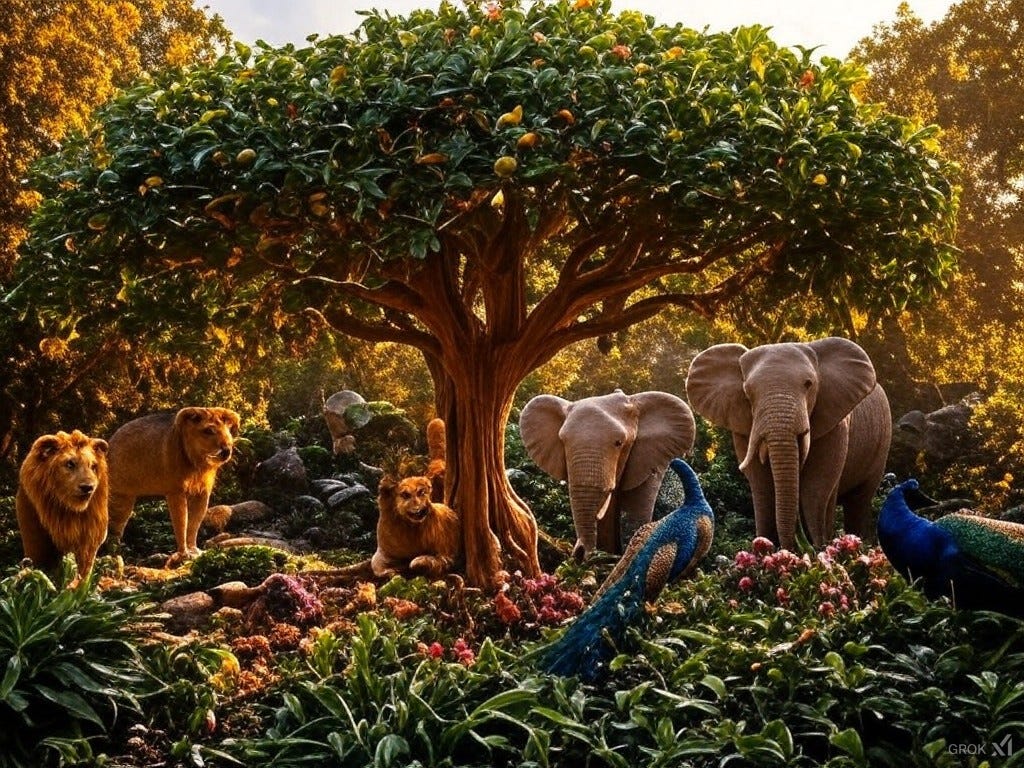2:17b “for in the [yom] that you eat of it, you will surely die.”
A Multidisciplinary Contextualized Analysis of Select Passages From Genesis Version 2.0
[This is an excerpt from a new edition I’m writing of a personal study of the book of Genesis, the first edition of which can be found here. The purpose of this exercise is to compare a close reading of the text to our current understanding of language, paleontology, and the physical sciences. Constructive discussion on the elements presented is always encouraged!]
Few narratives from Genesis are more famous than that of the “forbidden fruit”. The popular interpretation of this passage is akin to the Greek myth of Pandora’s Box. It is through the violation of this lone ordinance that the “original sin” was released into the world. These legends imply that evil would not exist if it were not for the unfortunate choice of one person.
However, there is only one passage in all of the Bible, Romans 5:12-14, making the claim that, “sin entered into the world through one man”. Otherwise, the few other times Adam is mentioned elsewhere are in similes where he is not necessarily considered the source of mankind’s sin but as an exhibit of how succumbing to wicked thoughts separates us from God.
Just as the various songs and psalms of the Old Testament deviate from the direct accounts somewhat to add hyperbole, the New Testament letters and ministry of the apostles may have leveraged such poetic license. Striving to be relevant and accessible to their audience, they would have taken familiar concepts or common social understanding of a community to add voracity to their ministry. Both may contain truths and insight even if an interpretive take on the source material.
When considered within the context of the Pentateuch as a whole, a vastly different rationale for the “tree of knowledge” is apparent:
In Exodus chapter 40 are detailed instructions for how to prepare oneself for entry to the tabernacle to commune with God. In Leviticus 10, “Nadab and Abihu, the sons of Aaron,” failed to follow protocol and they died. 2 Samuel 6:3-8 tells how Uzzah died instantly from touching the Ark of the Covenant despite his good intentions at the time. The common thread is that these individuals were not appropriately “clean” at that time to be in such close proximity to God’s direct power.
Consistent throughout the Bible is the concept of cleanliness which is a holistic state of body and mind. The procedures for Tabernacle entry are excruciatingly detailed, and even King David was afraid of being anywhere near the Ark of the Covenant. But for whatever reason, direct interaction with God’s power or presence is only survivable if one is in a worthy state both physically and mentally.
Adam, being directly formed by God for the purpose of unrestricted interaction, was intentionally made without the knowledge of or perhaps even the capacity for understanding right and wrong. Eve and the animals that populate Eden in the subsequent verses are not gathered from the existing numbers but formed by the same process and for the same reason. If God is to have fluid physical interaction among His creation, a rarified manifestation of it is necessary.
So why allow this tree of knowledge to exist at all? This brings up the philosophical ramifications of the necessity of choice and free will in a relationship which is not in the scope of this analysis. It is what this fruit is purported to do which will be addressed in the analysis of chapter 3, verse 7.
Specifically to 2:17, the use of the term “yom” once again refers not to a calendar day but that it is an action acter in which Adam initiates a period of time during which he will expire. This implies that Adam was formed devoid of the impurities of body and mind that make fluid interaction with God prohibitive.
Eden was to be a perpetually “clean” menagerie in which God could commune directly with the creatures He created. In addition to extraordinary telomerase capabilities, a protected and idealized environment could have supported the lives of those therein indefinitely.
This story resembles Pinnochio more than Pandora in that Adam is an idealized and effectively timeless version of a human. Whether the forbidden fruit bestowed actual knowledge, enabled dormant human natures, or was simply symbolic, it initiated the period where Adam was to begin living as if he was a normal human. And since humanity is generally incapable of maintaining the state of body and mind by which we can perpetually be in God’s direct presence, Adam and Eve could not stay in Eden. Without the additional protection or support that environment provided, their telomerase would not indefinitely outpace the oxidative stress on their DNA. In short, they would get old and eventually die.
A Multidisciplinary Contextualized Analysis of Select Passages From Genesis
This is a collection of excerpts from a longer personal study of the book of Genesis. It is the 2nd edition I’m currently writing. The 1st edition can currently be found here downloadable for free.




